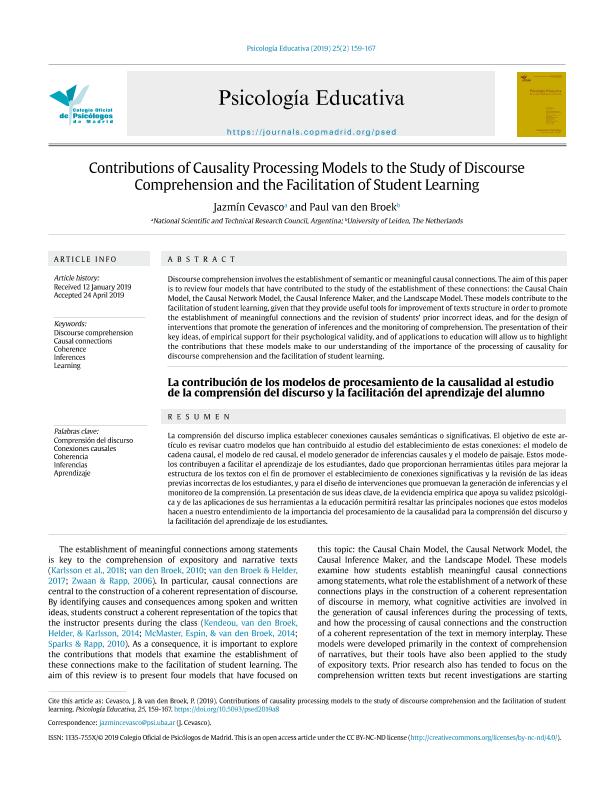Mostrar el registro sencillo del ítem
dc.contributor.author
Yomha Cevasco, Jazmin

dc.contributor.author
Van Den Broek, Paul
dc.date.available
2021-01-18T13:47:34Z
dc.date.issued
2019
dc.identifier.citation
Yomha Cevasco, Jazmin; Van Den Broek, Paul; Contributions of causality processing models to the study of discourse comprehension and the facilitation of student learning; Colegio Oficial de Psicologos de Madrid; Psicologia Educativa; 25; 2; 2019; 159-167
dc.identifier.issn
2174-0526
dc.identifier.uri
http://hdl.handle.net/11336/122825
dc.description.abstract
Discourse comprehension involves the establishment of semantic or meaningful causal connections. The aim of this paper is to review four models that have contributed to the study of the establishment of these connections: the Causal Chain Model, the Causal Network Model, the Causal Inference Maker, and the Landscape Model. These models contribute to the facilitation of student learning, given that they provide useful tools for improvement of texts structure in order to promote the establishment of meaningful connections and the revision of students’ prior incorrect ideas, and for the design of interventions that promote the generation of inferences and the monitoring of comprehension. The presentation of their key ideas, of empirical support for their psychological validity, and of applications to education will allow us to highlight the contributions that these models make to our understanding of the importance of the processing of causality for discourse comprehension and the facilitation of student learning.
dc.description.abstract
La comprensión del discurso implica establecer conexiones causales semánticas o significativas. El objetivo de este artículo es revisar cuatro modelos que han contribuido al estudio del establecimiento de estas conexiones: el modelo de cadena causal, el modelo de red causal, el modelo generador de inferencias causales y el modelo de paisaje. Estos modelos contribuyen a facilitar el aprendizaje de los estudiantes, dado que proporcionan herramientas útiles para mejorar la estructura de los textos con el fin de promover el establecimiento de conexiones significativas y la revisión de las ideas previas incorrectas de los estudiantes, y para el diseño de intervenciones que promuevan la generación de inferencias y el monitoreo de la comprensión. La presentación de sus ideas clave, de la evidencia empírica que apoya su validez psicológica y de las aplicaciones de sus herramientas a la educación permitirá resaltar las principales nociones que estos modelos hacen a nuestro entendimiento de la importancia del procesamiento de la causalidad para la comprensión del discurso y la facilitación del aprendizaje de los estudiantes.
dc.format
application/pdf
dc.language.iso
eng
dc.publisher
Colegio Oficial de Psicologos de Madrid
dc.rights
info:eu-repo/semantics/openAccess
dc.rights.uri
https://creativecommons.org/licenses/by-nc-nd/2.5/ar/
dc.subject
CAUSAL CONNECTIONS
dc.subject
COHERENCE
dc.subject
DISCOURSE COMPREHENSION
dc.subject
INFERENCES
dc.subject
LEARNING
dc.subject.classification
Psicología

dc.subject.classification
Psicología

dc.subject.classification
CIENCIAS SOCIALES

dc.title
Contributions of causality processing models to the study of discourse comprehension and the facilitation of student learning
dc.title
La contribución de los modelos de procesamiento de la causalidad al estudio de la comprensión del discurso y la facilitación del aprendizaje del alumno
dc.type
info:eu-repo/semantics/article
dc.type
info:ar-repo/semantics/artículo
dc.type
info:eu-repo/semantics/publishedVersion
dc.date.updated
2021-01-08T14:15:14Z
dc.identifier.eissn
1135-755X
dc.journal.volume
25
dc.journal.number
2
dc.journal.pagination
159-167
dc.journal.pais
España

dc.description.fil
Fil: Yomha Cevasco, Jazmin. Consejo Nacional de Investigaciones Científicas y Técnicas; Argentina
dc.description.fil
Fil: Van Den Broek, Paul. Leiden University; Países Bajos
dc.journal.title
Psicologia Educativa
dc.relation.alternativeid
info:eu-repo/semantics/altIdentifier/url/https://journals.copmadrid.org/psed/art/psed2019a8
dc.relation.alternativeid
info:eu-repo/semantics/altIdentifier/doi/http://dx.doi.org/10.5093/psed2019a8
Archivos asociados
